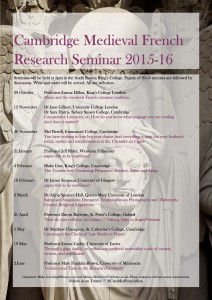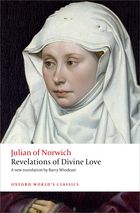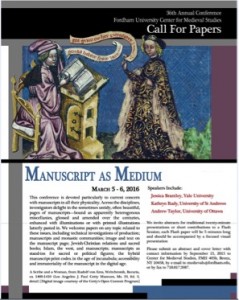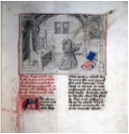The Beinecke Rare Book & Manuscript Library invites abstracts for twenty-minute papers for two sessions, “Rolls and Scrolls after the Codex: New Approaches to an Old Technology” and “Working with Manuscript Fragments,” at next year’s International Congress on Medieval Studies in Kalamazoo. Both sessions seek to explore approaches to non-codex manuscripts across a variety of disciplines.
Rolls and Scrolls after the Codex: New Approaches to an Old Technology
Organizers: Katherine Hindley, Anya Adair, and Ray Clemens (Yale University)
Despite the ascendancy of the codex in the medieval period, the technology of the manuscript roll/scroll remained a popular means of presenting and preserving texts and images. This panel aims to encourage conversation on the subject of medieval rolls and scrolls by inviting papers engaging with any aspect of this physical format and/or the texts it contained.
Papers offering new research into the form or content of medieval manuscript rolls and scrolls are encouraged – from the details of their codicological features to the content of the texts they contain. Some ongoing questions of rolls research that papers might address include: How do form and content interact in rolls? What is their social status? How are we to understand and tackle the codicological challenges of manuscript artifacts that rest so uncomfortably under the label “codex”? What digital tools are best able to render rolls research accessible, adaptable and interactive?
The session conceives of research on rolls in the broadest sense to foster what we hope will become a sustained conversation about this tenacious form. Music and liturgical rolls, religious and legal records, domestic accounts, genealogies and chronicle histories, and literary works are all of interest. We welcome interdisciplinary connections between paleography, literature, art history, history, and language study, as well as work taking on the digital humanities challenges of these non-codex materials. Literary textual editors, students of diplomatics, Torah scholars and those researching Latin and vernacular materials are encouraged to share insights on the common technology of their texts.
Working with Manuscript Fragments
Organizers: Elizabeth Hebbard and Ray Clemens (Yale University)
Manuscript fragments are rich mines for investigation. They contain codicological clues to several layers of use: physical wear, for example, can demonstrate how a fragment was recycled as a wrapper or as reinforcement in a binding. Similarly, marks of ownership, frequently penned on fragments serving as flyleaves and wrappers, can provide further information about readers, owners, and users of the fragment both in its original and its repurposed form. Fragments still in situ in bindings can indicate a great deal about the mobility of both manuscript and printed texts at their point of intersection in a binding. The fragmentary manuscript, seen in this light, is both a network of scribal and reader communities, and a means to reconstruct such communities.
Still other kinds of stories are told by whole leaves, resulting predominantly from the unfortunately widespread practice of biblioclasty among book dealers beginning in the early twentieth century. In both cases, digital humanities furnishes tools that allow scholars to recognize and reassemble fragments belonging to one another, now scattered across many institutions.
This session invites contributions from all academic disciplines that consider manuscript fragments of any kind: individual manuscript fragments, fragment collections, broken books, and the reconstruction of fragmented texts and manuscripts. How do fragments travel, and where? What methodologies are best suited to “fragmentology”? What challenges do fragments pose to current cataloguing methods? Given that texts bound in codices are often incomplete, what is the status of the “fragment” and the “fragmentary” with regard to the medieval material record?
Submission Instructions
Deadline: 10 September 2015
Submit abstracts to:
anya.adair@yale.edu (Rolls and Scrolls after the Codex)
or elizabeth.hebbard@yale.edu (Working with Manuscript Fragments)
Please send also a completed Participation Information Form (http://www.wmich.edu/medieval/congress/submissions/index.html#PIF)



